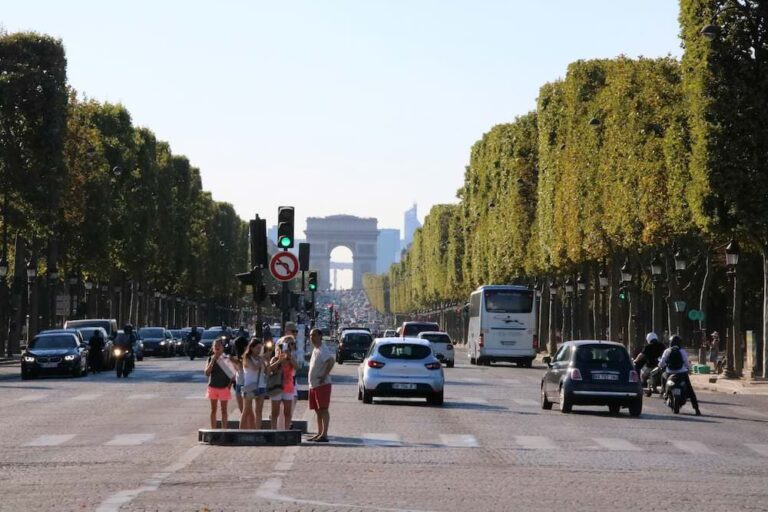-uire verbs
French verbs that end in -uire belong mostly to the third group (irregular verbs). Here is a list of common -uire verbs:
- Conduire (to drive, to lead)
- Cuire (to cook)
- Détruire (to destroy)
- Éconduire (to dismiss, to turn away)
- Enduire (to coat, to smear)
- Induire (to induce, to lead to)
- Introduire (to introduce, to insert)
- Luire (to shine, to glow)
- Produire (to produce)
- Reconduire (to renew, to escort back)
- Réduire (to reduce)
- Reproduire (to reproduce)
- Séduire (to seduce, to charm)
- Traduire (to translate)
Most of these verbs follow a similar conjugation pattern, where the -uire ending changes in the present tense (e.g., je conduis, tu conduis, il conduit, nous conduisons).
Conjugation of -uire Verbs in French
Verbs ending in -uire mostly follow the same conjugation pattern. Below is a detailed breakdown using conduire (to drive) as an example.
Present Tense (Présent)
| Person | Conjugation |
|---|---|
| Je | conduis |
| Tu | conduis |
| Il/Elle/On | conduit |
| Nous | conduisons |
| Vous | conduisez |
| Ils/Elles | conduisent |
✅ Pattern:
- The singular forms (je, tu, il/elle/on) remove -re and take -s, -s, -t.
- The plural forms (nous, vous, ils/elles) keep -uis but add -ons, -ez, -ent.
📝 Example Sentences:
- Je conduis une voiture. (I drive a car.)
- Ils conduisent prudemment. (They drive carefully.)
Imperfect Tense (Imparfait)
| Person | Conjugation |
|---|---|
| Je | conduisais |
| Tu | conduisais |
| Il/Elle/On | conduisait |
| Nous | conduisions |
| Vous | conduisiez |
| Ils/Elles | conduisaient |
✅ Pattern:
- Start with the nous form of the present tense (conduisons).
- Remove -ons and add the imperfect endings -ais, -ais, -ait, -ions, -iez, -aient.
📝 Example:
- Quand j’étais petit, je conduisais un vélo. (When I was little, I used to ride a bike.)
Past Participle & Compound Tenses
- Past Participle: conduit
- Passé composé (with avoir):
- J’ai conduit une moto hier. (I drove a motorcycle yesterday.)
Future Tense (Futur Simple)
| Person | Conjugation |
|---|---|
| Je | conduirai |
| Tu | conduiras |
| Il/Elle/On | conduira |
| Nous | conduirons |
| Vous | conduirez |
| Ils/Elles | conduiront |
✅ Pattern:
- Use the infinitive stem conduir- and add -ai, -as, -a, -ons, -ez, -ont.
📝 Example:
- Il conduira une voiture électrique. (He will drive an electric car.)
Subjunctive Mood (Présent du subjonctif)
| Person | Conjugation |
|---|---|
| Je | conduise |
| Tu | conduises |
| Il/Elle/On | conduise |
| Nous | conduisions |
| Vous | conduisiez |
| Ils/Elles | conduisent |
✅ Pattern:
- The je, tu, il/elle/on, ils/elles forms resemble the present tense (conduis-).
- The nous, vous forms follow the imperfect pattern.
📝 Example:
- Il faut que tu conduises prudemment. (You must drive carefully.)
List of Other -uire Verbs With Their Past Participles
| Verb | Meaning | Past Participle |
|---|---|---|
| Cuire | to cook | cuit |
| Détruire | to destroy | détruit |
| Éconduire | to dismiss | éconduit |
| Enduire | to coat | enduit |
| Induire | to induce | induit |
| Introduire | to introduce | introduit |
| Luire | to shine | lui |
| Produire | to produce | produit |
| Reconduire | to renew/escort | reconduit |
| Réduire | to reduce | réduit |
| Reproduire | to reproduce | reproduit |
| Séduire | to seduce | séduit |
| Traduire | to translate | traduit |
Note
- The verb luire (to shine) is irregular:
- Past participle is lui (not luit).
- Examples:
- Ses yeux luisent dans l’obscurité. (His/her eyes glow in the dark.)
- Le matin luit sur les collines. (The morning light shines on the hills.)
- It is mostly used in literary or poetic contexts.






